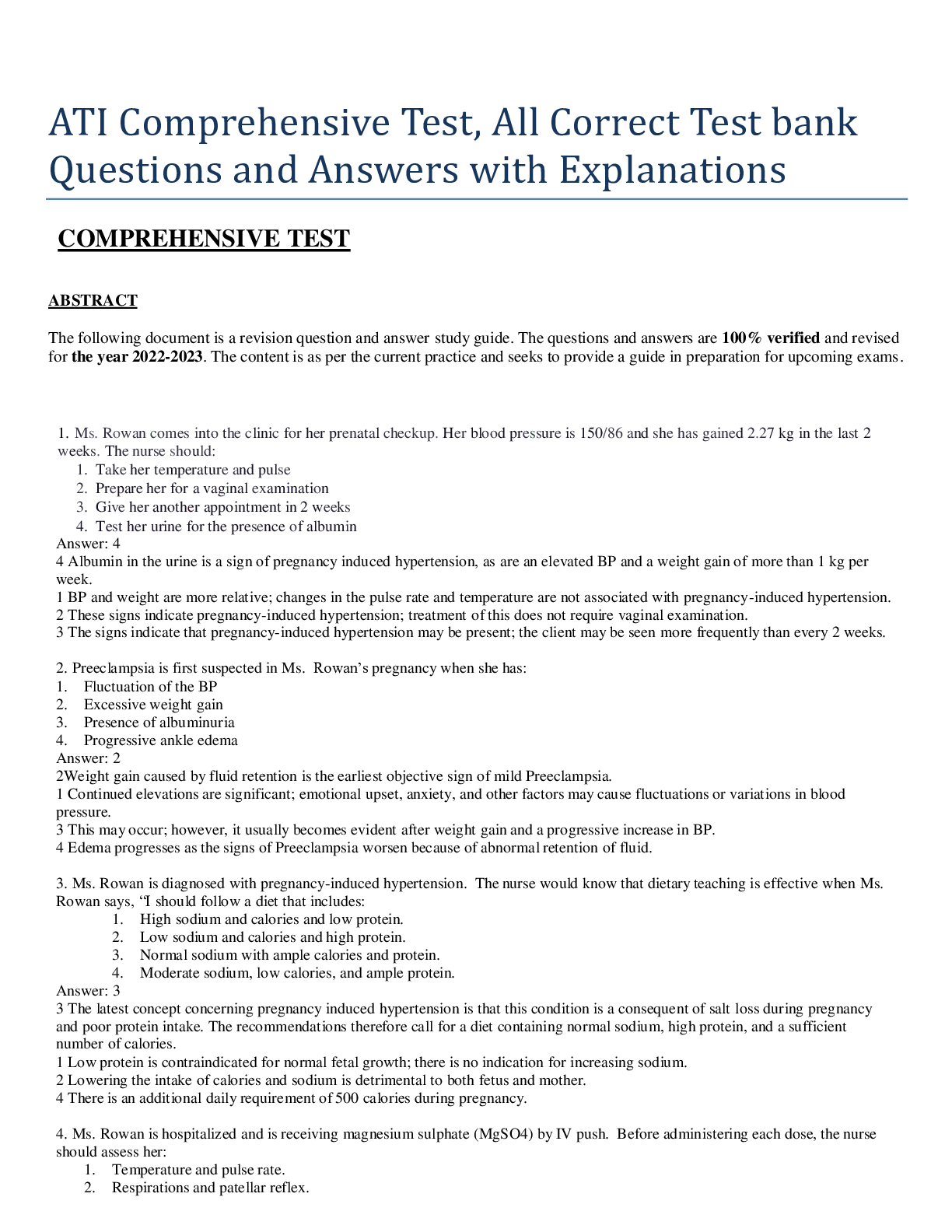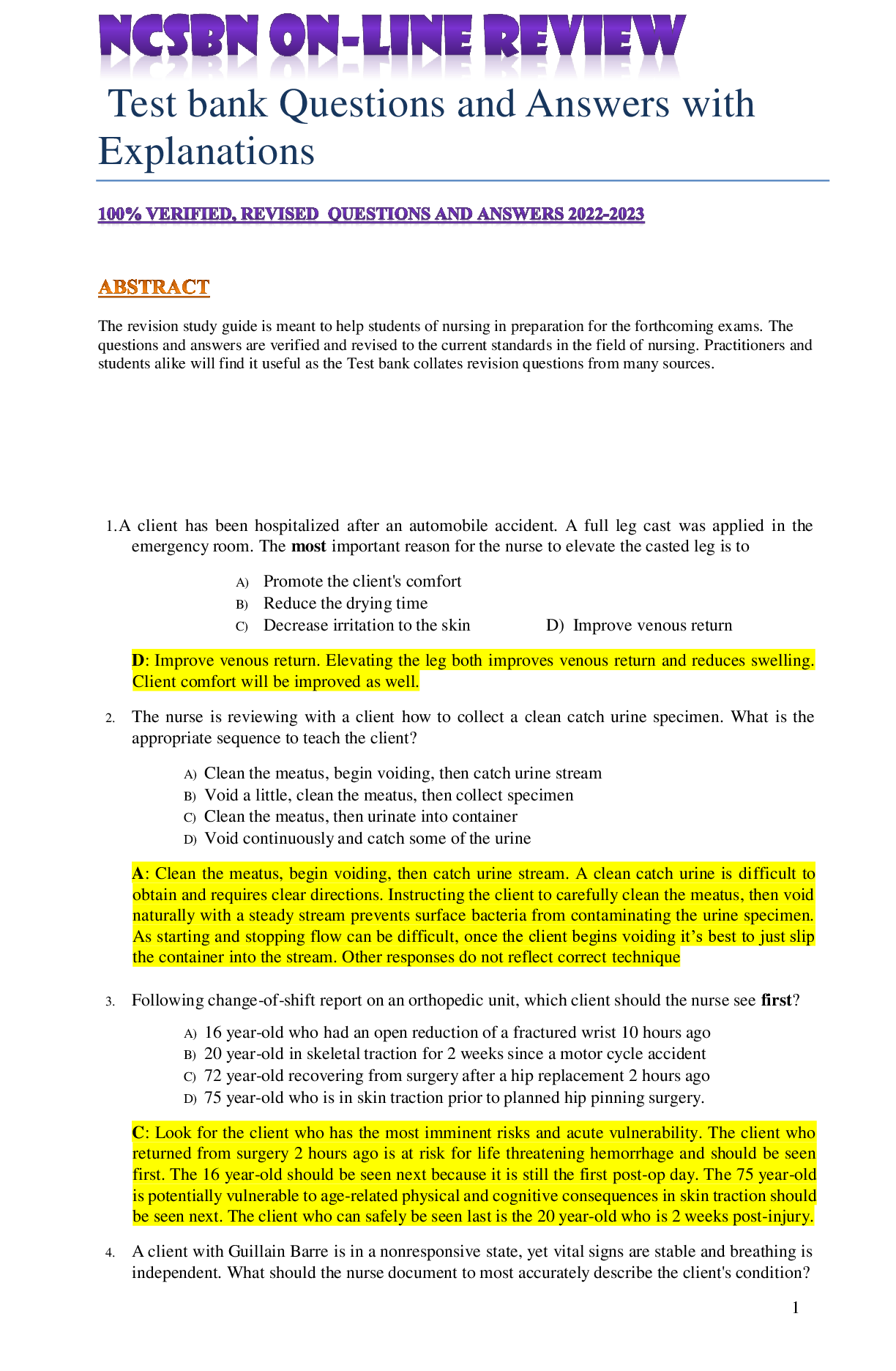*NURSING > QUESTIONS & ANSWERS > CARE FOR OLDER ADULTS TEST BANK QUESTIONS AND ANSWERS, RATED A+ (All)
CARE FOR OLDER ADULTS TEST BANK QUESTIONS AND ANSWERS, RATED A+
Document Content and Description Below
A negative attitude towards aging and the aged is called: A. geriatrics B. racism C. ageism D. ethnocentrism Answer: C Which of the following is not considered a core competency for nurses carin... g for older adults? A. Analyze the impact of an aging society on the health care system B. Obtain certification in gerontological nursing C. Prevent or reduce common risk factors that contribute to functional decline D. Recognize one's own attitudes about aging Answer: B The nurse wishes to obtain basic certification in the specialty of gerontological nursing. Which of the following is true about this credential? A. there is an experience requirement B. one must pass an exam C. one must have a BSN D. a and b only Answer: D When the nurse reads an article and uses the findings of a study to improve the quality of the patients for whom she cares, she is implementing the role of: A. teacher B. manager C. research consumer D. advocate Answer: C A lawyer wishes to hire a nurse consultant who has advanced education and certification in gerontology. Based on their listed credentials, which of the following nurses best fits his wishes? A. Sally Smith, RN, BSN, BC B. Mary Malloy, RN, MS, GNP C. Andy Jones, LPN, CRRC 1D. Greg Reed, RN, MSN Answer: B The AACN/John A. Hartford Foundation Competencies are helpful to nurses because they: A. offer suggestions about how to gain employment in geriatrics B. provide a guideline for the knowledge that is expected to provide quality care to older adults C. were designed to prepare nurses to pass the State Board Exam D. were written for nurses working on a graduate degree in gerontology Answer: B The nurse has a question about the appropriateness of an older patient's medication dose. Which of the following professionals would be best qualified to answer such a question? A. the geropsychologist B. the geropharmacist C. the financial gerontologist D. the gerontological rehabilitation nurse Answer: B The health care professional who wants to gain experience in working with older adults who are post-acutely recovering from serious illness or injury, have challenging medical issues needing 24 hour per day nursing, but who cannot yet tolerate a full rehabilitation program may be best suited for employment in what setting: A. acute care hospital B. assisted living C. rehabilitation D. subacute care Answer: D Which of the following levels of care would be most appropriate for a healthy 84 year old man who can take care of himself, but wants to live in a place where he can socialize and have help available if needed? A. a group foster home B. a transitional care unit C. an independent unit in a senior living complex D. assisted living in a nursing home 2Answer: C Which of the following is not true about assisted living facilities? A. if their care needs become too great, they may have to seek other living arrangements B. persons pay for assistance out of pocket C. the average resident is in his 60's D. they have assumed about 15% of the previous nursing home population Answer: C A person aged 84 would be classified, according to current systems, as: A. young B. middle C. old D. very old Answer: B The clinical nurse specialist (CNS) in gerontology differs from the GNP in that: A. the GNP usually works in a collaborative practice with a physician B. the CNS has less education than the GNP C. the GNP has a doctorate D. the CNS does less consulting than the GNP Answer: A What is the most compelling reason for health professionals to be educated in the area of gerontology? A. to address the comprehensive nursing shortage B. to make an increase in salary C. to prepare to be challenged by the educated baby boomers D. to prepare to care for the growing number of older persons in the population Answer: D An intergenerational approach to care for the aging is advisable because of what fact? A. baby boomers want their children to take of them in old age B. Gen X and Gen Y persons do not know anything about aging 3C. most older persons are cared for by their children D. nearly a half million grandparents are raising their grandchildren Answer: D What best explains the lack of prepared, qualified health professionals to care for the aged? A. a shortage of nursing faculty B. medical programs not including gerontology content C. not enough health professionals choosing gero as a specialty D. the current nursing shortage Answer: C There were approximately 36 million Americans over the age of 65 years in 2000 and this number is expected to grow to 71 million by 2030 A. TRUE B. FALSE Answer: A Over half of women over the age of 85 are widowed A. TRUE B. FALSE Answer: A There are more males in the population than females A. TRUE B. FALSE Answer: B Most centenarians (people over the age of 100 years) are White and female A. TRUE B. FALSE 4Answer: A Minority elderly groups are growing and thus present unique challenges for nurses today A. TRUE B. FALSE Answer: A The majority of older persons live alone A. TRUE B. FALSE Answer: B Older women who live alone tend to be more from lower income groups than those who are married A. TRUE B. FALSE Answer: A Elderly Hispanics rate their overall health significantly higher than those from other ethnic groups A. TRUE B. FALSE Answer: B Older persons tend to die from acute illnesses more than chronic diseases A. TRUE B. FALSE Answer: B The major causes of death in the older age group are heart disease, AIDS, and tuberculosis 5A. TRUE B. FALSE Answer: B (It's Heart Disease, Cancer and Strokes) Which ethnic/cultural group has a higher rate of diabetes, hypertension, and chronic renal disease than other ethnic groups? A. African Americans B. Hispanics C. Asians and Pacific Islanders D. American Indians and Alaskan natives Answer: A Which ethnic/cultural group is the most rapidly growing ethnic minority, and less likely to obtain preventive services such as flu vaccines and mammograms? A. African Americans B. Hispanics C. Asians and Pacific Islanders D. American Indians and Alaskan natives Answer: B Which ethnic/cultural group is comprised of many subgroups and generally have a longer life expectancy than white Americans? A. African Americans B. Hispanics C. Asians and Pacific Islanders D. American Indians and Alaskan natives Answer: C Which ethnic/cultural group makes up a small percentage of America's elderly population and have increased morbidity and mortality related to diabetes and renal disease? A. African Americans B. Hispanics C. Asians and Pacific Islanders D. American Indians and Alaskan natives 6Answer: D List the three leading causes of death in the elderly: Answer: Heart disease, Cancer, Stroke The theory of aging that says that personality and coping patterns remain consistent through life is: A. continuity B. gerotranscendence C. human needs D. life course Answer: A Erikson's stages of personality development for a person that is 76 years old would be: A. autonomy versus shame B. integrity versus despair C. generativity versus isolation D. trust versus mistrust Answer: B A biological theory of aging that is based on random events that cause cellular damage versus genetically programmed events is called: A. nonstochastic B. Orgel / error C. selective optimization D. stochastic Answer: B A scientist who believes that people have a genetic programming that determines or predicts longevity is a supporter of which theory? A. age stratification B. cross-link C. free radical 7D. gene/biological Answer: D When a Native American Indian elder goes out into the woods to die and the tribe does not search for him, but allows him to withdraw, this could be an example of: A. activity theory B. disengagement theory C. subculture D. person-environment fit Answer: B A 99 year old widow who has lived alone in her own home for 40 years experiences a fall and is sent by her children and grandchildren to a nursing home. The woman refuses to eat and exhibits signs and symptoms of depression and withdrawal. Which theory does this most describe? A. functional consequences B. theory of thriving C. neuroedncorine D. immunological Answer: B The physician tells his 81-year-old male patient that his health has deteriorated due to the exogenous sources of free radicals to which he has exposed himself for many years. To what is the physician most likely referring? A. the ozone layer B. the patient's cigarette smoking C. the patient's alcohol consumption D. radiation from the patient's microwave Answer: B MATCHING 1) continuity theory A. personality and coping patterns remain consistent through life 2) stochastic theories B. remaining active and involved promotes life satisfaction in later year 3) neuroendocrine theory C. transformation towards oneness with the universe 4) activity theory D. cells wear out with age 5) gerotranscendence theory E. five basic needs that motivate behavior 6) nonstochastic theories F. problems with gland feedback leads to disease 87) theory of thriving G. based on random events that cause cellular damage 8) human needs theory H. genetically programmed events cause cellular damage that lead to aging 9) functional consequences theory I. failure to thrive is from discord in relationships 10) wear and tear theory J. (Miller’s Theory) nurse’s role is risk reduction to enhance safety Answer: 1) continuity theory (A) A. personality and coping patterns remain consistent through life 2) stochastic theories (G) B. remaining active and involved promotes life satisfaction in later year 3) neuroendocrine theory (F) C. transformation towards oneness with the universe 4) activity theory (B) D. cells wear out with age 5) gerotranscendence theory (C) e. five basic needs that motivate behavior 6) nonstochastic theories (H) F. problems with gland feedback leads to disease 7) theory of thriving (I) G. based on random events that cause cellular damage 8) human needs theory (E) H. genetically programmed events cause cellular damage that lead to aging 9) functional consequences theory (J) I. failure to thrive is from discord in relationships 10) wear and tear theory (D) J. (Miller’s Theory) nurse’s role is risk reduction to enhance safety Which of the following visual changes is not usually associated with normal aging? a. presbyopia b. yellowing of the lens c. night blindness d. decreased accommodation Answer: C All of the following are considered IADLs (Instrumental Activities of Daily Living) except: a. toileting b. balancing the checkbook c. using the phone d. shopping Answer: A (this is considered an ADL) Old persons may have difficulty picking up their pills from a medicine cup because of: a. macular degeneration b. decreased touch sensation that comes with old age c. peripheral neuropathy d. all of the above 9Answer: D An older adult who complains of a dark spot in the center of the visual field is showing signs of: A. cataracts B. macular degeneration C. acute glaucoma D. diabetic retinopathy Answer: B An older adult who complains of seeing dark shadows around the center of the visual field is showing signs of: A. cataracts B. macular degeneration C. glaucoma D. diabetic retinopathy Answer: C An older adult who complains of blurry vision and has a bluish-white coating that can be seen on the lens is showing signs of: A. cataracts B. macular degeneration C. acute glaucoma D. diabetic retinopathy Answer: A Which of the following factors could contribute to an older person's inability to hear instructions given by the nurse? A. cerumen impaction B. nurse not facing the person when giving directions C. loss of high frequency pitches D. all of the above Answer: D The nurse is trying to take a history from a cooperative but fearful older person with mild dementia. Which of the following would be the most therapeutic strategy to use for this interaction? A. sit calmly in a chair next to the person and ask questions in a non-threatening manner 10B. ask loud, direct questions C. have the person write down the information on the chart D. ask the family member instead of the person Answer: A While speaking with a patient who is experiencing depression, which of the following strategies might be most helpful? A. speaking very loudly since they are certainly hard of hearing B. recording important information for them in a notebook to refer to later C. ignoring the person and discussing their condition with a family member D. telling them that their depression will go away on its own if they think positively Answer: B In caring for a person experiencing delirium, which of the following is least effective in enhancing communication? A. speak in simple sentences B. offer frequent reassurance C. use physical restraints to control anxious behavior D. use large print clocks and calendars Answer: C List five nursing strategies for enhancing memory in the older adults with mild dementia. Answer: Journaling, keeping a record of the day, using familiar items, posting reminders, using calendars and clocks If an older person with hearing impairment complains of not being able to hear what the nurse is saying, what could be a contributing cause of this? A. normal age-related changes B. build up of cerumen C. the nurse not facing the person when speaking D. all of the above Answer: D 11An older patient has had a stroke that resulted in Broca's aphasia. Which of the following would be most typical of Broca's aphasia? A. fluent speech B. impaired comprehension C. broken speech D. global problems Answer: C Which of the following signs would you consider an abnormal finding for a 75 year old female? A. blood pressure of 110/78 B. Hct (hematocrit) of .41 C. resting pulse of 80 D. urinary incontinence Answer: D A significant result of changes in the respiratory system with advanced age is: A. lower carbon dioxide levels in the bloodstream B. less useful oxygen available with each breath C. more efficient gas exchange at the alveolar level D. the ability to hold one's breath longer Answer: B One of the most significant changes in the reproductive system for older females who are sexually active is: A. decreased vaginal lubrication B. atrophy of uterus C. decreased libido D. lack of male partners Answer: A You are helping care for your 89 year old grandmother who is sick with "the flu". Her temperature is 101.2. What other information would be most useful to better assess your grandmother's condition? A. what her temperature was yesterday B. how long she has felt sick C. what her usual temperature is D. how much she ate today 12Answer: C Which of the following would be an abnormal finding in assessment of an 80 year old male? A. decreased cardiac output B. decreased stage IV sleep C. loss of hearing of low frequency tones D. age spots on the hands and face Answer: C Which of the following changes in the skeletal system is least characteristic of normal aging? A. decreased range of motion B. loss of height up to 10 cm C. chronic inflammation of joints D. loss of some muscle mass Answer: C All of the following are intrinsic changes in the integumentary system except: A. increased skin temperature B. sagging and wrinkling C. age spots D. increased risk of bruising Answer: A Which of the following is true about normal aging changes in the GI system? A. absorption of nutrients does not change with age B. absorption of certain vitamins does change with age C. small intestine transit rate is relatively unchanged with age D. all of the above Answer: D Which of the following aging changes is most significant to renal efficiency? 13A. loss of up to half of functioning nephrons B. decreased cardiac output C. nocturia D. a and b Answer: D The aging eye shows all of the following changes except: a. better ability to focus on near objects b. decreased lens accommodation c. decreased peripheral vision d. presbyopia Answer: A A 72 year old female with the following assessment factors is admitted to the acute care for elderly (ACE) unit. Which of the following requires the most immediate treatment? A. BP = 140/ 90 mm Hg B. Hgb (hemoglobin) = 7 g/dl C. hypogeusia D. presbycusis Answer: B Mrs. Jones is a 50 year old female who complains of hot flashes, moodiness, and skipping menstrual periods. She tells you that the physician suggests she is going through menopause, and asks, "aren't I too young for menopause?" What is your best response? A. Yes, you are too young. Your symptoms must be something else. B. The average age for menopause is 51, but many women experience these symptoms earlier. C. I think you should get a second opinion in case it is something serious. D. No. You are not too young for menopause, but the average age is 56. Answer: B Immunosenescence refers to: A. acquired immunity B. innate immunity C. aging of the immune cells D. better replication of the cells that fight infection 14Answer: C Which of the following is a reason why older females may develop vaginitis? A. lower estrogen levels B. atrophy of the vaginal canal C. decreased lubrication of the vagina D. all of the above Answer: D The nurse wishes to use a tool to help assess the functional status of the older residents in the nursing home where she works. Which of the following would be least appropriate for this purpose? a. Katz index b. MDS c. Barthel Index d. Gibson self-care scale Answer: D Which of the following is the best example of an open-ended question/statement that would promote verbalization from an older person? A. tell me about your major problem today B. do you have any complaints today? C. are you having any major problems? D. do you want to talk about your major complaint? Answer: Name four essential areas to address to promote communication as discussed in this chapter. Answer: Invite-respect, Environment, Understanding, Communication Changes in which of the following body systems are generally most noticeable to the naked eye? A. respiratory B. integumentary 15C. gastrointestional D. neurological Answer: The nurse working in rehabilitation would most likely see what measure used to evaluate progress of patients in rehabilitation? A. Katz index B. MDS C. FIM D. OASIS Answer: C In assessing IADLs, the nurse will ask questions about all but which of the following patient activities? a. cooking b. shopping C. using the phone D. bathing Answer: D In assessing the circulatory system of an older adult, the nurse would recognize which of the following as abnormal? A. resting pulse rate of 120 B. blood pressure of 118/78 C. respirations of 26 D. a and c Answer: D When assessing the respiratory system of an older person, which of the following is the least essential to ask during history taking? A. use of tobacco products B. feelings of shortness of breath C. exposure to environmental toxins D. all are important to ask about 16Answer: D All of the following may contribute to an older patient complaining of constipation except….. A. decreased thirst mechanism B. changes in peristalsis with age C. lack of fiber in diet D. increased physical activity Answer: D 7) It is important to include sexuality in a comprehensive assessment of older persons because: A. changes occur with normal aging that may impact performance B. older adults still engage in sexual intercourse C. changes in sexual preference in later life often pose conflicts D. a and b Answer: D Neurological assessment of the older person should include: A. history of medications and herbs used B. assessment of swallowi [Show More]
Last updated: 1 year ago
Preview 1 out of 57 pages
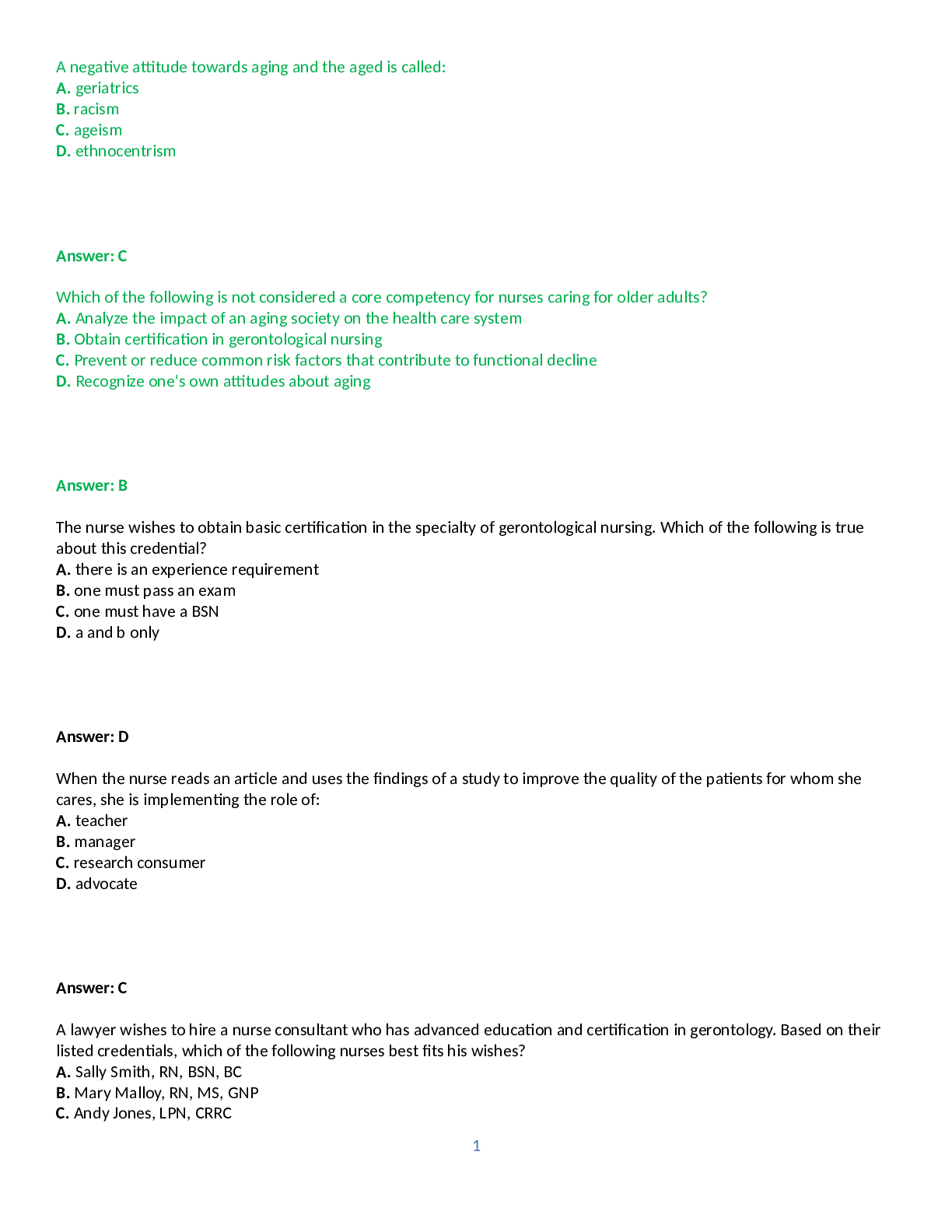
Buy this document to get the full access instantly
Instant Download Access after purchase
Add to cartInstant download
We Accept:

Reviews( 0 )
$8.00
Document information
Connected school, study & course
About the document
Uploaded On
Aug 24, 2022
Number of pages
57
Written in
Additional information
This document has been written for:
Uploaded
Aug 24, 2022
Downloads
0
Views
111

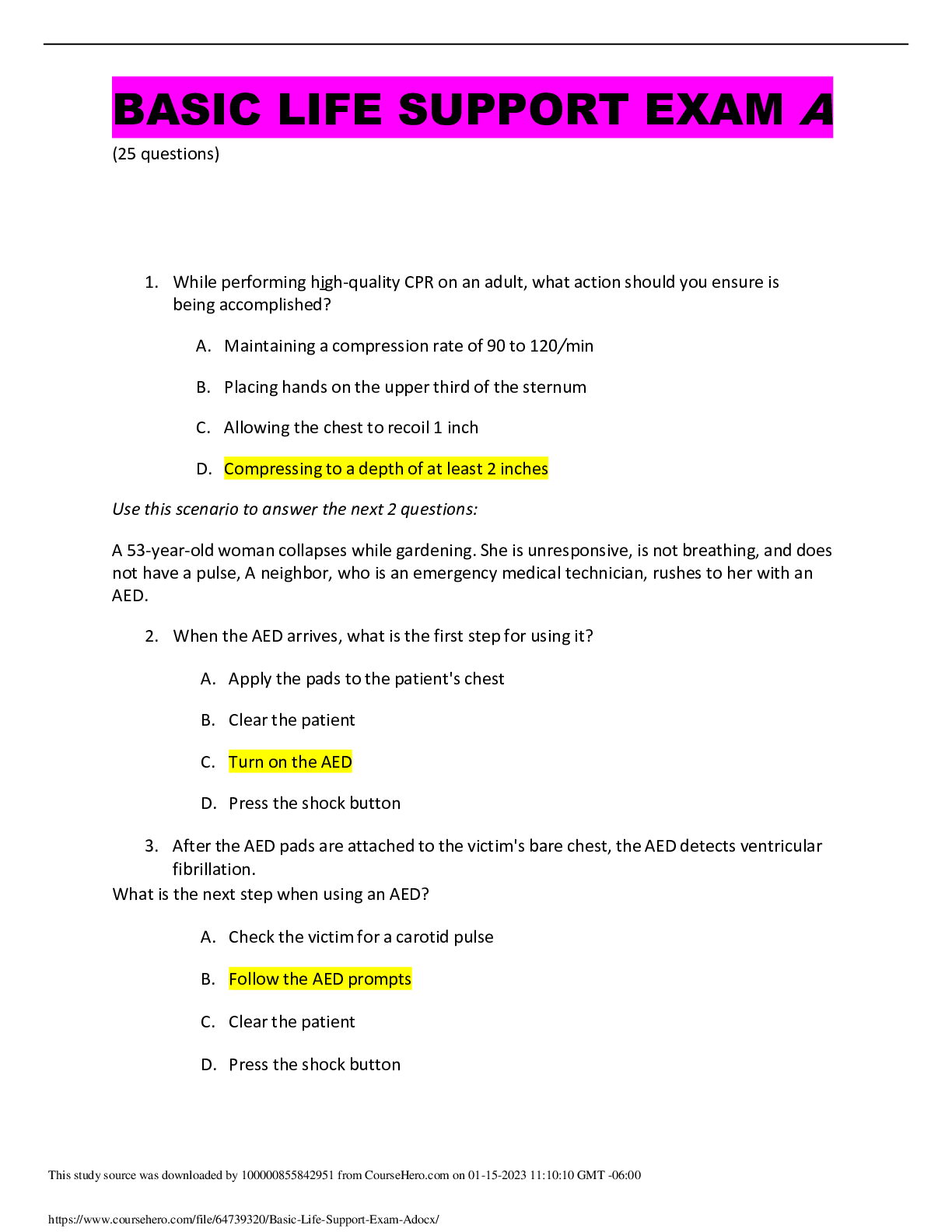
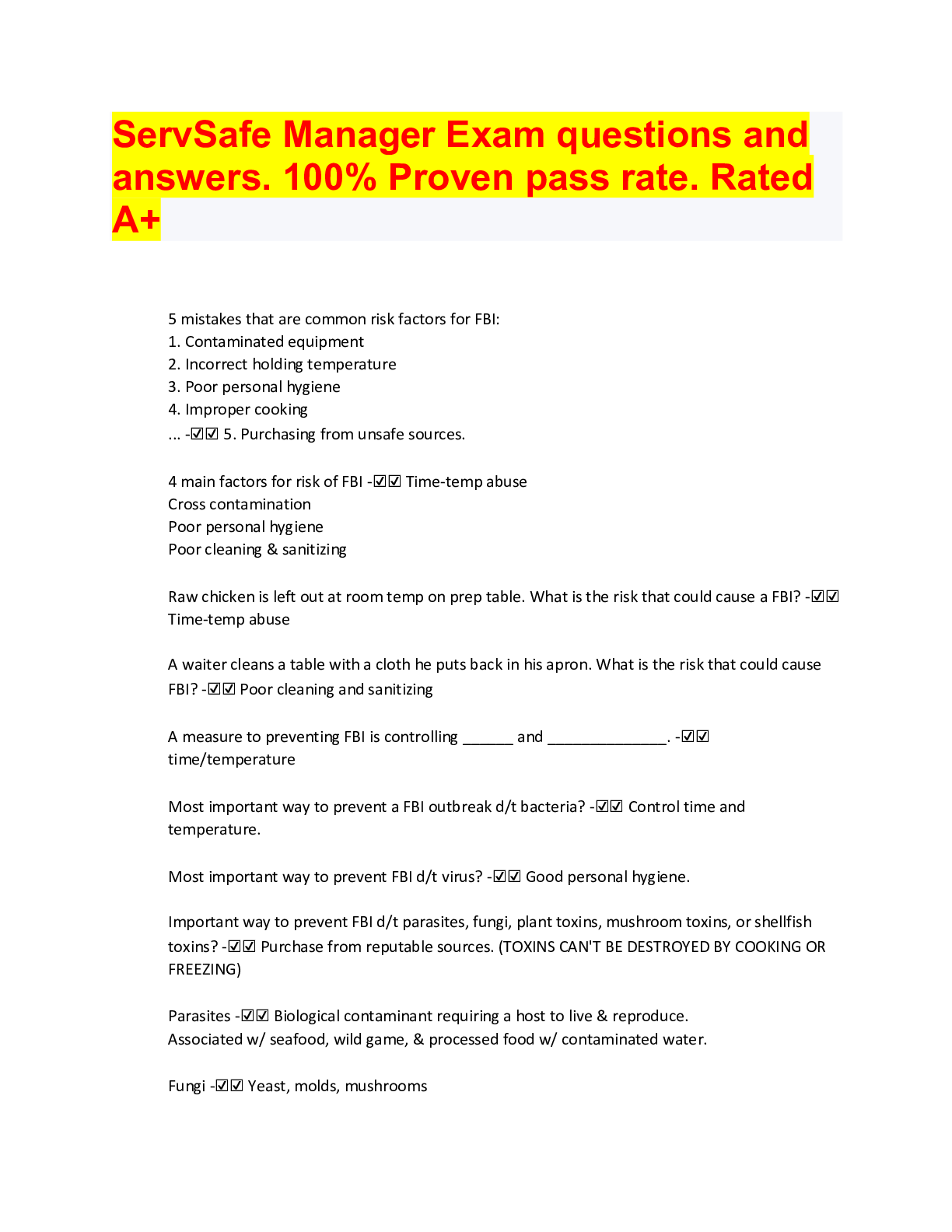
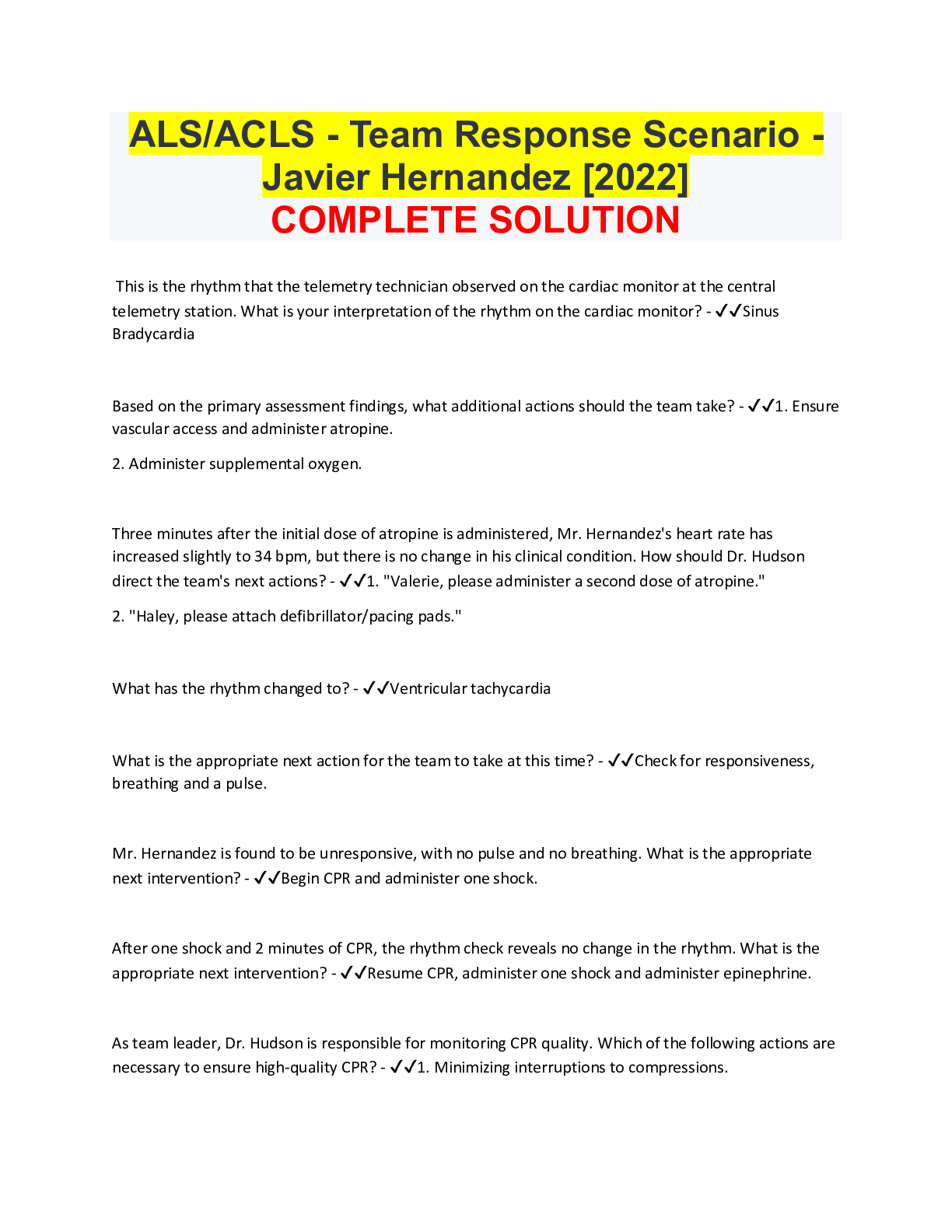
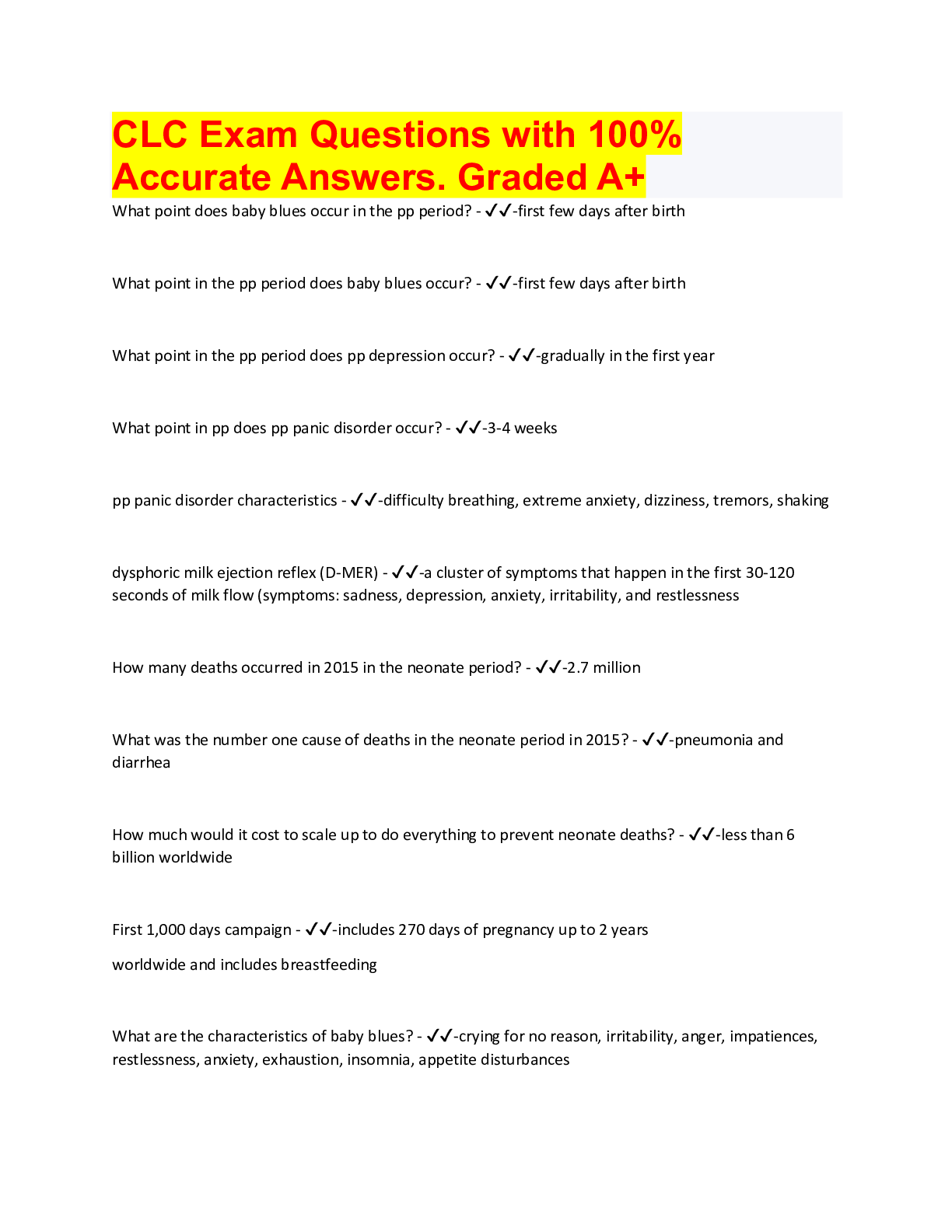
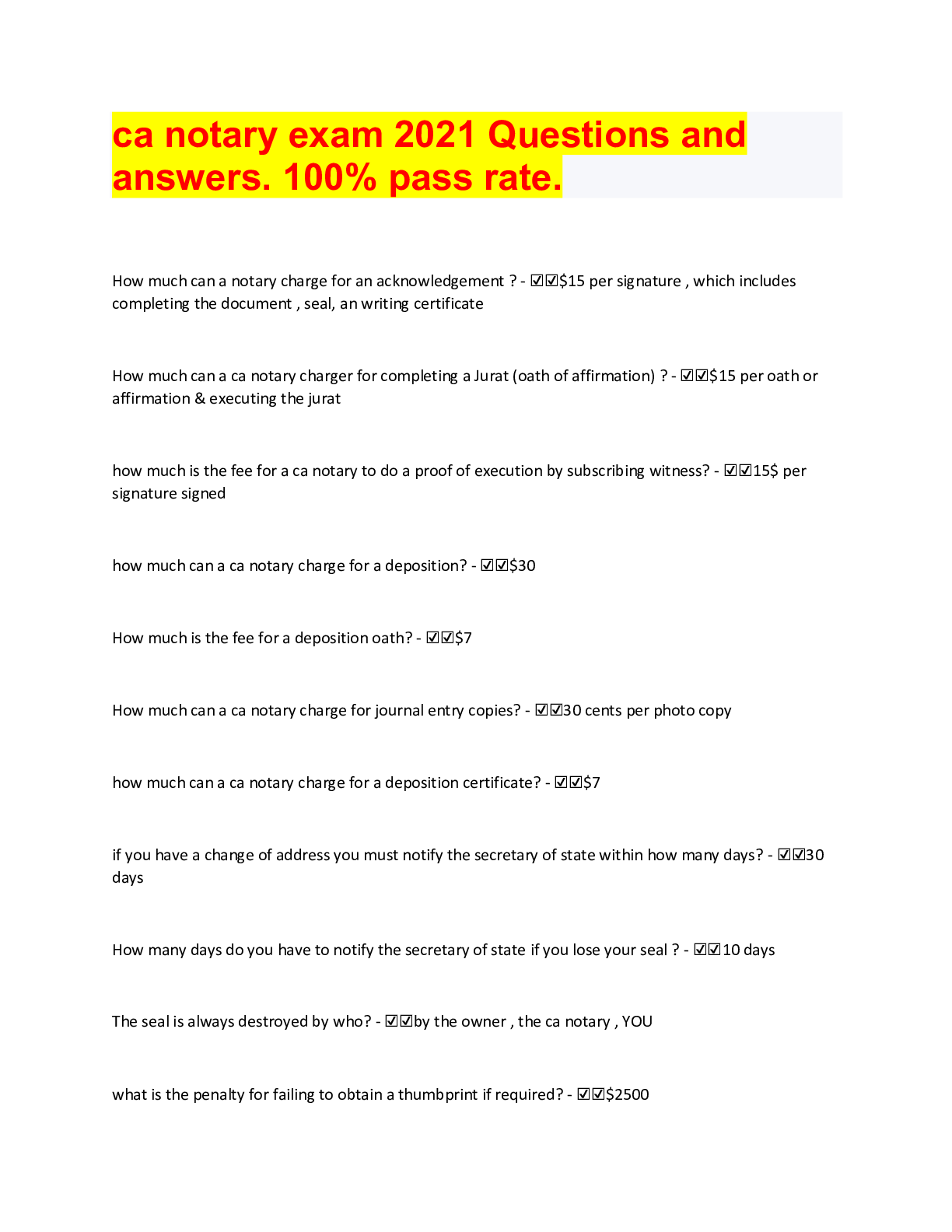
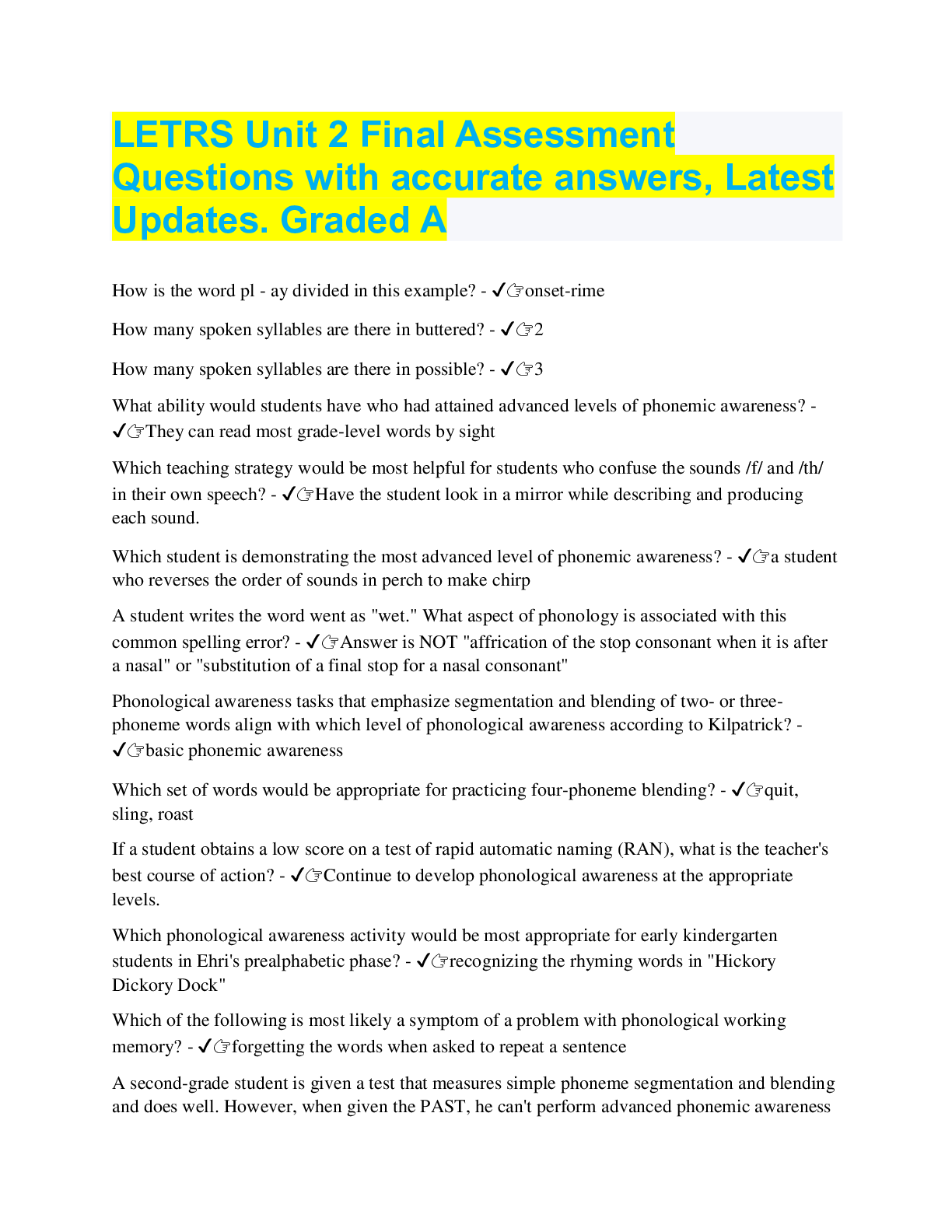
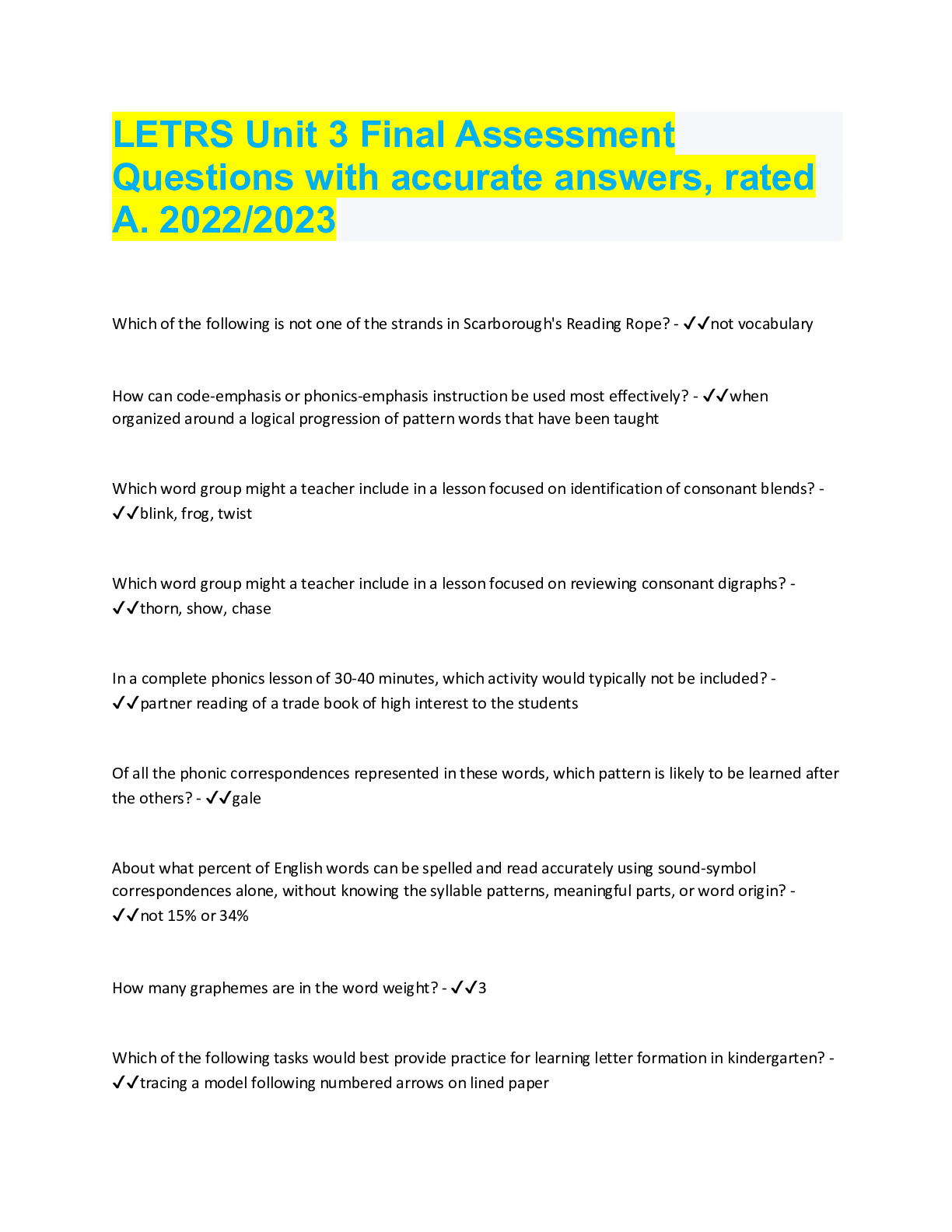

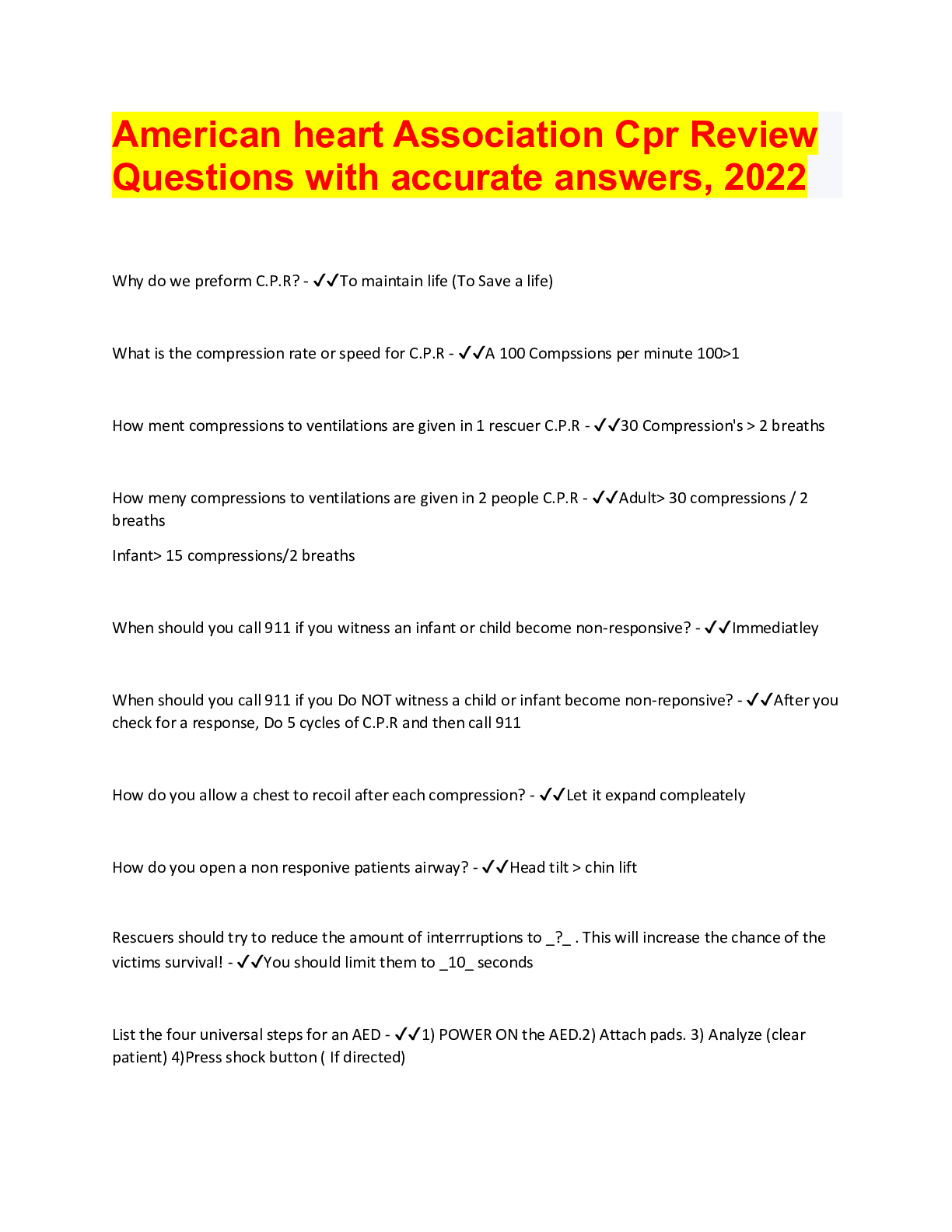
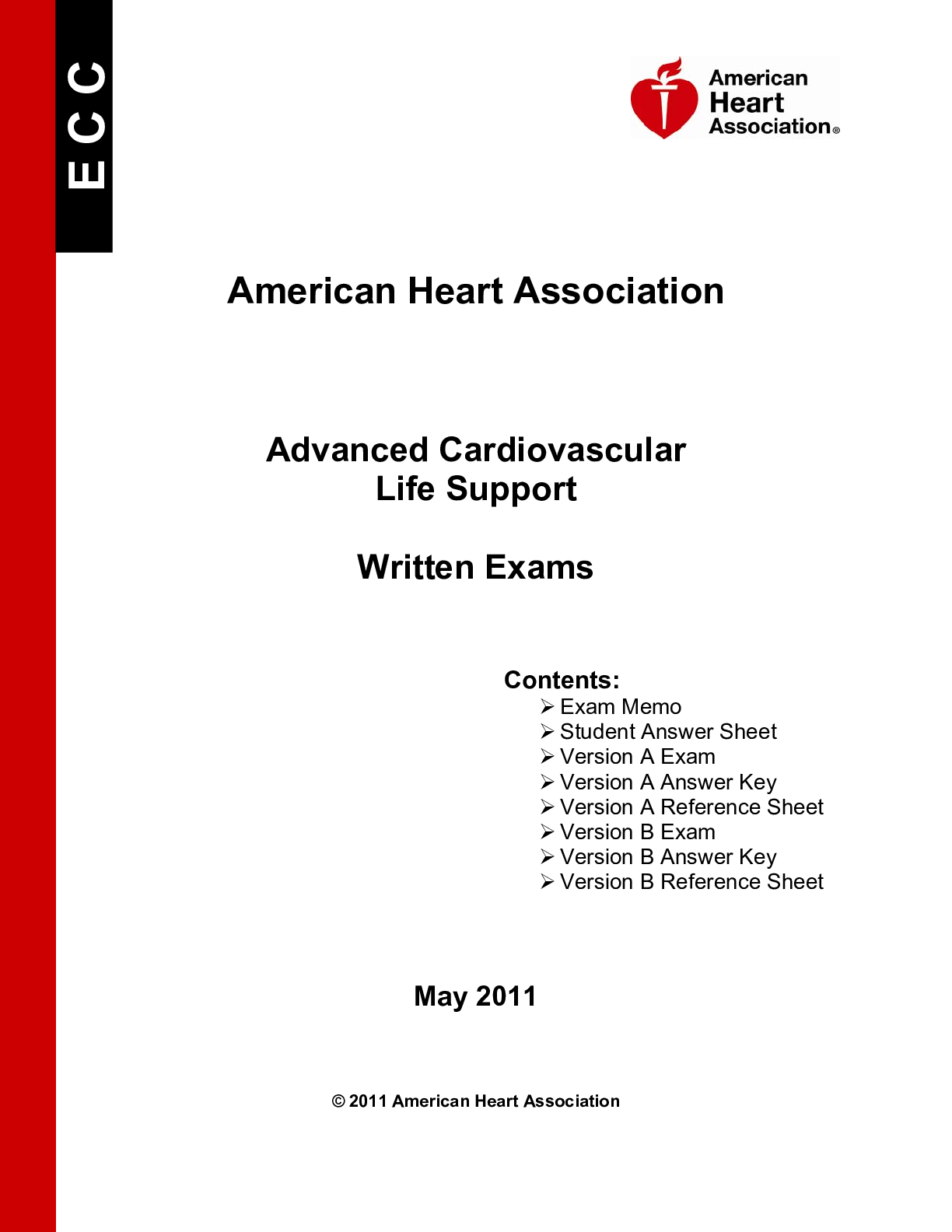
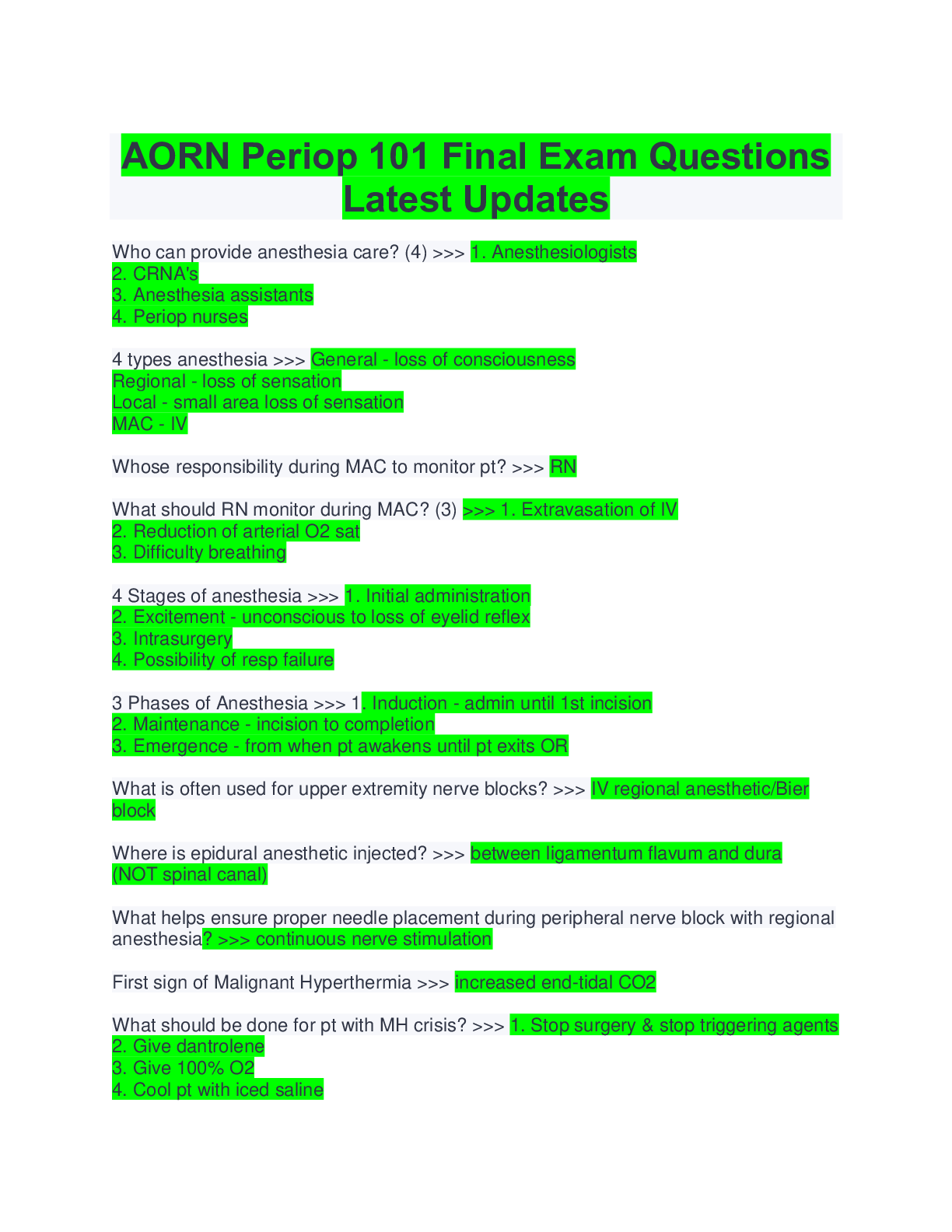
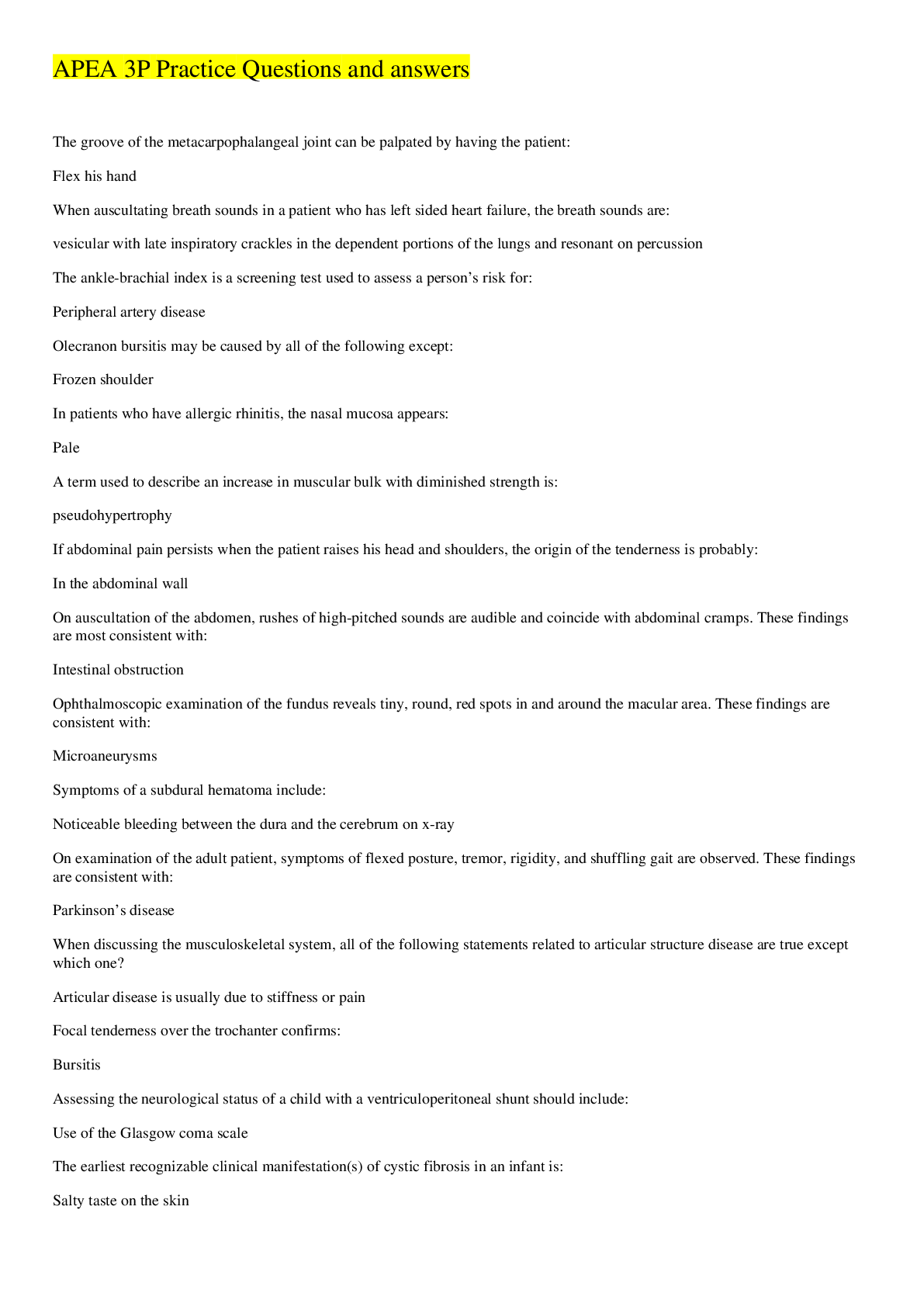
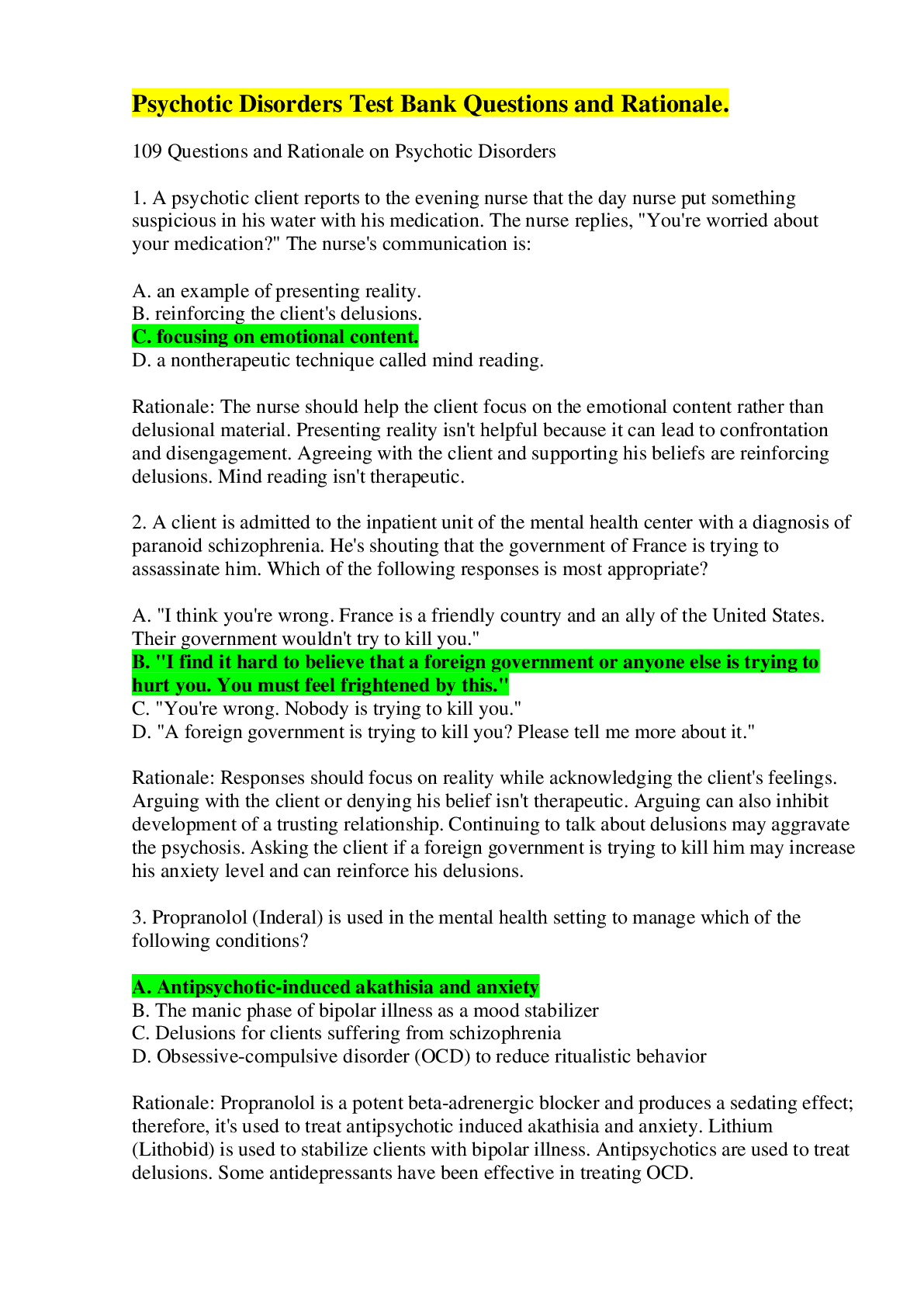
 ans.png)
, 100% Correct, Download to Score A.png)
, 100% Correct, Download to Score A.png)
 Questions and Answers (latest Update), 100% Correct, Download to Score A.png)
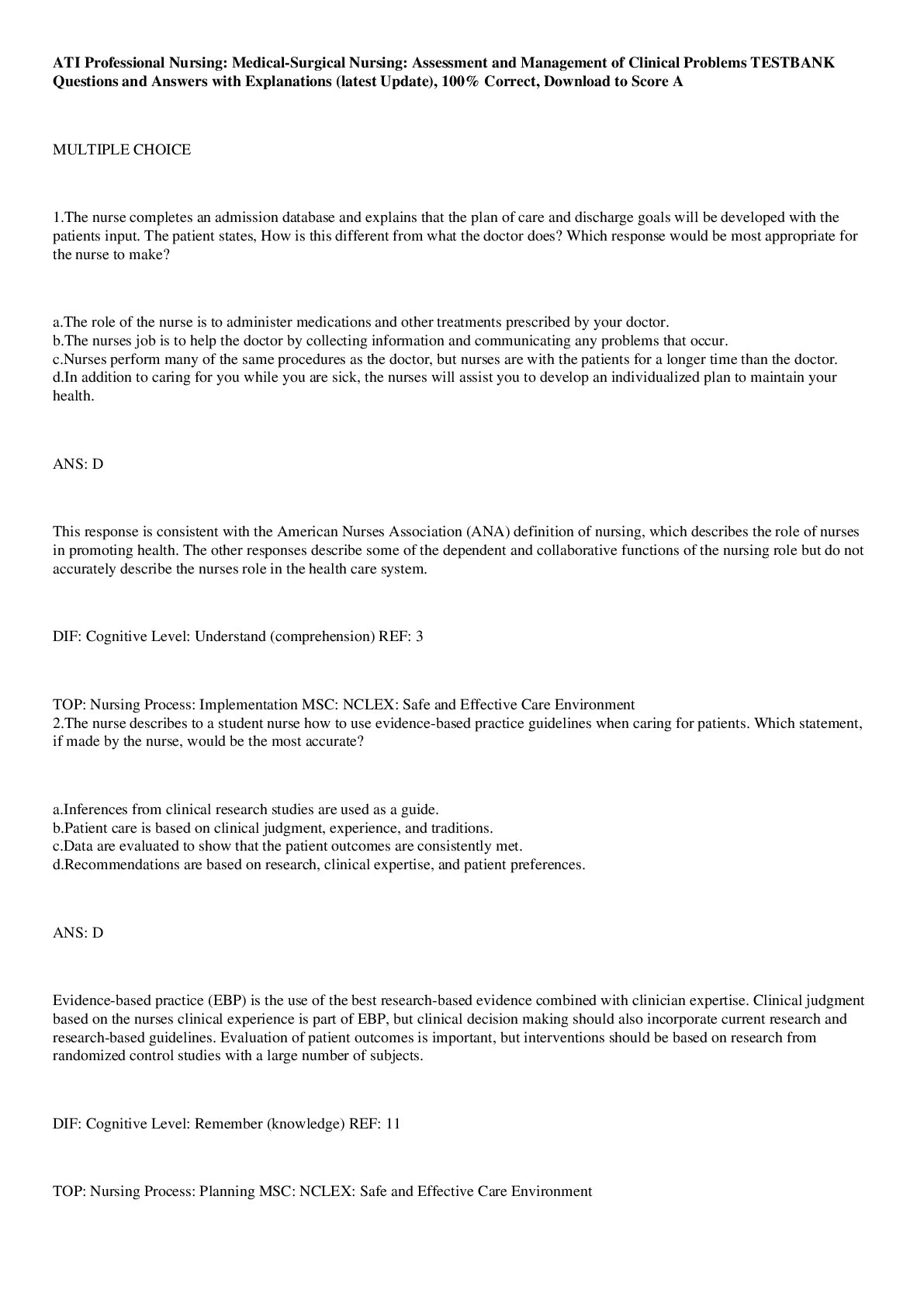
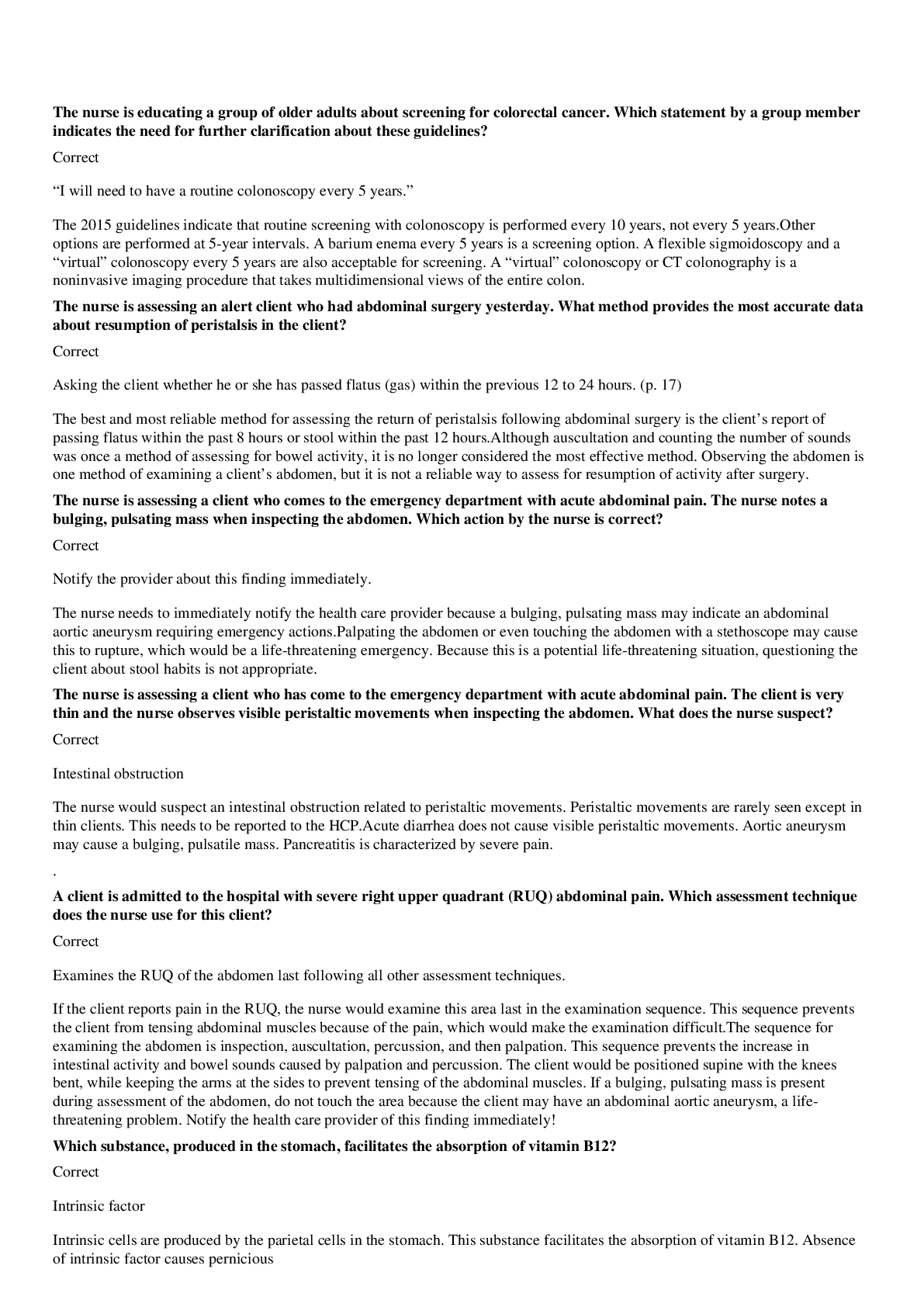
, All Correct Test bank Questions and Answers with Explanations.png)
